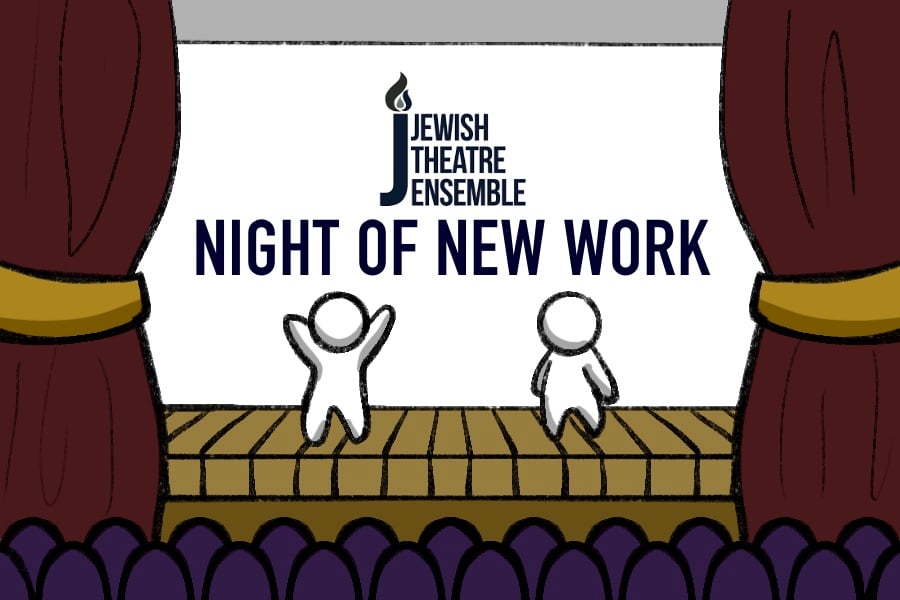Humanity from a Jewish perspective: JTE premieres student-written plays at A Night of New Work
Director Alexa Goldstein said A Night of New Work emphasizes tolerance and shared experience through the use of Jewish values.
March 1, 2022
Student-written plays “All-In” by Communication junior Andy Hartman and “The Attendant” by Communication senior Ilana Zahava Abuschwill premiere at the Jewish Theatre Ensemble’s “Night of New Work” from March 4 to 5.
Executive director and Communication senior Lily Feinberg said the productions provide commentary on the human experience through the lens of essential Jewish values.
As one of Northwestern’s largest student-run theatre boards, JTE is committed to producing faith-based theatre with support from Northwestern Hillel. Artists, literary managers and Jewish education experts work to promote messages in every production that are “specifically Jewish, universally human,” Feinberg said.
“Night of New Work” is one of two special events JTE hosts each year, in addition to three full scale productions. Plays included in the 2022 season were selected last spring to allow creative teams ample time to build a show from the ground up.
NU Hillel executive director Michael Simon serves as the faculty advisor for JTE, which was founded under Hillel in 1995. Simon said the two organizations share a parallel mission: to create an inclusive space for self-expression based on the cornerstones of Jewish faith.
“Dance, theatre and visual arts are universal expressions of creativity with particular cultural perspectives,” Simon said. “Providing the frameworks to examine these variations of Jewish identity is the special sauce that JTE brings.”
The exploration of Judaism in the arts encompasses more than religious teachings, Feinberg said. Storytelling and community connection play a prevalent role in Jewish culture and are principles JTE has championed throughout their 27 seasons of existence.
In 2019, JTE performed “Into the Woods” as part of their winter season repertoire. Though not Jewish in nature, Feinberg said integral aspects of Stephen Sondheim’s classic musical including narration, fairytales and a strong familial unit reflected the Hebrew motto “‘L’dor vador” meaning “from generation to generation.’”
Feinberg said the adoption of less overt religious themes is what makes JTE welcoming to all students regardless of religious affiliation.
Hartman first tried his hand at creating an original piece in Communication lecturer Julie Marie Myatt’s “Intro to Playwriting” class offered here his sophomore year. Throughout the quarter, Hartman said he drew upon interactions from his own life to build the basis of a story.
The inspiration for “All-In” came from Hartman’s experience as a high school student learning to drive in New York City. Loosely based on the instructor who taught him the rules of the road, Hartman said the play looks more broadly at the relationships between teachers and students and the emotional development of young adults in the intimate atmosphere of a car.
The Jewish ideal of Tzedakah, or “giving back,” is a prominent theme in the play. Hartman said he grappled with the difference between helping someone and saving someone while writing the show, especially in the wake of pandemic devastation.
“The play revolves around the question of ‘What does it mean to help another person?’” Hartman said. “That is not just a tenant that Jewish people aspire to, but all people.”
“The Attendant” director and Communication sophomore Alexa Goldstein said Abusch’s play leans similarly on religious ideals to portray the blending of modern and traditional Jewish forces in regards to feminism.
Through her work with JTE, Goldstein hopes audiences realize the factors that unite us rather than tear us apart. In a world where viewpoints are constantly evolving, Goldstein said a Night of New Work shines a light on tolerance towards others no matter their religious affiliation.
“Understanding is not always the key,” Goldstein said. “But acceptance always will be.”
Email: [email protected]
Twitter: @NixieStrazza
Related Stories:
— Nine years in, Seesaw Theatre’s co-founders reflect on its past
— Daveed Diggs discusses identity, ‘Hamilton’ in Hillel annual speaker event
— Lipstick Theatre’s witchy comedy “Sunrise Coven” focuses on idea of healing


